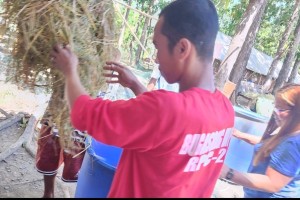SAN JOSE, Antique (PIA) -- The Office of the Provincial Veterinarian (Provet) is currently helping livestock farmers cope with the impact of El Niño on animals, especially the ruminants.
Provet Supervising Agriculturist Francisca Huele emphasized the need to devise ways to help the livestock, especially the ruminants such as the goats, cattle, and carabaos as they could be hardly affected in case fodder becomes scarce due to dry season.
To help the farmers in Bugasong, Antique, the Provet conducted training for the caretakers of the Goat Multiplier Farm Project of Bugasong Multipurpose Cooperative (MPC) in Sitio Inulingan, Barangay Camanggahan on how to make Urea-Molasses Treated Rice Straw (UMTRS).
During the training, Huele explained that UMTRS is an alternative feed to ruminants (grass-eating animals) as fodder in cases of scarcity of grass that might be caused by the long dry spell.
“Rice straw as a by-product of rice production post-harvest could be a good animal food when made into Urea-Molasses Treated Rice Straw,” she said.
Huele added that UMTRS is also a good source of nitrogen for livestock.
To make 100 kilograms of UMTRS, the Department of Agriculture recommends a mixture of 4.40 kilograms urea, 4 kilograms molasses, 91.6 liters water,

and 50-100 kg rice straws, fermented approximately for 30 days, sealing it airtight.
Huele also noted the nutritional value that UMTRS could give to lactating ruminants that could eventually lead to an increase in the income of livestock raisers.

Provet then recommended the use of UMTRS since rice straws are readily available in the farmlands which can be turned into feed rather than burning them.
Huele said that 60 percent to 80 percent of rice straws go to waste. Using rice straws is not only healthy for the animals but also reduces air pollution.
To Provet, there is a need to give animals enough water and food to ensure they stay healthy despite the effects of El Niño.
Similar training was given to the farmers and technicians in the municipality of Patnongon last year according to Provet.
To further reach more farmers in Southern Antique, Huele noted another scheduled training for the livestock raisers in Tobias Fornier in the coming weeks. (AGP/PSM/PIA Antique)



